Want to know who’ll be the Next Big Thing? Look no further than the alumni of the WA Academy of Performing Arts. Scoop goes behind the scenes at WAAPA and meets the graduates whose names you will see up in lights.
At the opening night of the Western Australian Academy of the Performing Arts' production of Legally Blonde, Edith Cowan University vice chancellor Steve Chapman found himself seated beside Ben Elton. During the show, the British comic genius behind the musical phenomenon We Will Rock You declared the production was "better than the one on the London stage".
"I was probably the proudest vice chancellor on the planet," Steve recalls. "The professionalism was unbelievable, the music superb, the choreography fantastic… it was absolutely stunning."
It won't be the last time he feels such pride. Whether it's musicals or Shakespeare tragedies, jazz or modern dance, opera or ballet, it's hard to overstate the phenomenal contribution WAAPA makes to the Australian arts. Earlier this year, when Wicked was playing in Perth, its star, Suzie Mathers, was one of eight WAAPA graduates in the cast. At about the same time, 2008 WAAPA graduate Jai Courtney was gracing the front cover of a Perth newspaper magazine, promoting the movie Terminator: Genisys with Arnold Schwarzenegger, while a national broadsheet was focusing on the hugely successful West End and Broadway runs of Matilda, co-written by WAAPA music graduate Tim Minchin.
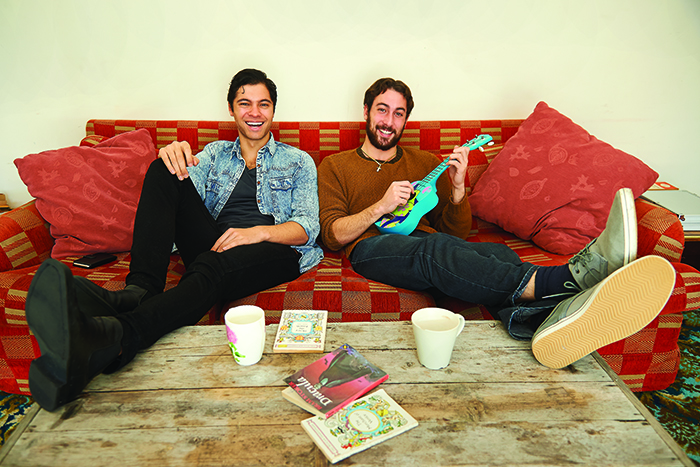
Residents of the Crack Shack, the legendary North Perth accommodation for WAAPA students.
And when it comes to successful WAAPA graduates, they're just the tip of the iceberg. Blue Heelers' darling Lisa McCune? Tick. Frances O'Connor, winner of Best Actress at the prestigious Monte Carlo Television Festival 2015 and Golden Globe nominee for her role in a British miniseries? Tick. Soprano Emma Matthews, singer/songwriter Meg Mac, Underbelly villain Marcus Graham, and Wonderland good girl Anna Bamford? Tick, tick, tick, tick.
Then, of course, there's Hugh Jackman. Stephanie Power, founder of WAAPA's archives, was in her final year of her acting course when Jackman arrived at WAAPA.
"I remember his father sent him a pair of white sneakers, and he was absolutely chuffed," she recalls. "We were all impoverished students then, and he was so excited at having a brand-new pair of sneakers that he wore them for about a week.
"The irony is that people give him so much clothing now... but he's still as down-
to-earth as he ever was, and he maintains that sense of wonderment."
Stephanie credits the academy's visionary founders and teaching staff for much of the success enjoyed by its acting students since the first intake in 1982.
Today, WAAPA boasts almost 1200 students (plus another 65 post-graduates) taking classes across eight disciplines: Aboriginal theatre, acting, arts management, dance, music, music theatre, performing arts, and production
and design.
Besides mainstream diplomas and degrees, the academy also offers a range of corporate training programs and short courses, as well as research in both dance and music.
"We're one of the few academies in the world that offers a full scope of courses,"
says current director Julie Warn AM. "I think WAAPA provides a connection to other students of the arts. They're not in isolation. If you're a dancer here, you'll be mixing with lighting students and jazz students, classical singers and performance makers."
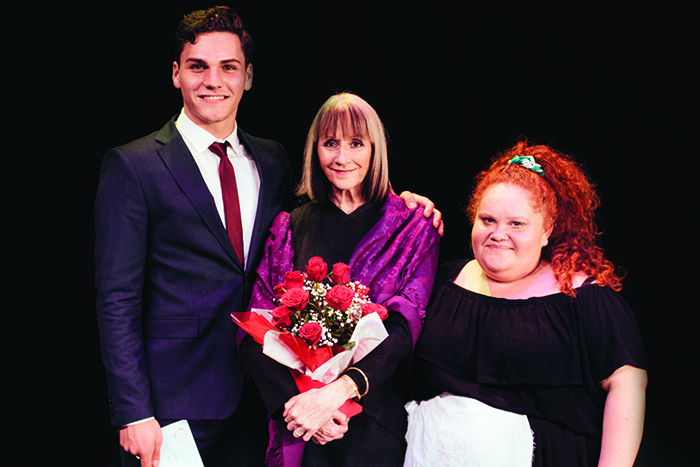
Ben Kindon and Megan Wilding, with Sally Burton.
It's a point made by many, including Sally Burton, the Perth widow of Welsh acting legend Richard Burton. She wasn't aware of WAAPA until she migrated to Australia in 2005 and met founding head of theatre, Nigel Rideout, who informed her that the best plays she would see in Perth would be at WAAPA. She now sponsors awards for final-year acting students.
"You've got the synergy here of all those students, and the energy is extraordinary," she says. "They all feed off each other and I don't think people
realise how unique WAAPA is in the world. To have everything under one roof is quite extraordinary.
"Also, the actors have respect for the other parts of making a play. There's nothing precious about WAAPA students. They know they are part of a machine so they're not divas. The first thing Richard Burton would do on a set is get to know the crew, because they're the guys who help you, they're the guys advising you."
Dr Andrea Moor, an actor turned director and teacher, agrees that WAAPA punches above its weight. Her 2013 doctoral thesis examined contemporary actor training in Australia's four main actor-training institutions: the National Institute of Dramatic Art (NIDA), the Victorian College of the Arts (VCA), Queensland University of Technology (QUT), and WAAPA. She interviewed casting directors, agents, directors, and drama teachers across the country as part of her research.
"WAAPA seems to stand alone in producing actors that are highly castable for all mediums, as each industry leader felt WAAPA graduates were well trained for screen and for theatre," she wrote.
One agent told her: "I will never commit to a NIDA graduate until I've seen what all the schools have on offer. Often, I'll be more impressed with a WAAPA graduate."
A Sydney casting director said she felt WAAPA "just gets stronger and stronger every year", and several others commented on the good etiquette of WAAPA graduates "who were not only well prepared for the work, but knew how to conduct themselves in the casting situation and on set".
"(A casting director) said... WAAPA had been ahead of NIDA in terms of on-screen training for years," Andrea wrote. Little wonder the academy's acting course, which takes only 18 students annually, last year attracted 715 applicants. Its reputation has travelled far and wide.
"I absolutely loved my time at WAAPA and I cannot speak more highly of the institution," says Suzie Mathers, a 2007 graduate. "But I never actually realised what a world-class institution it is until I moved to the UK and started auditioning for the major musicals over there.
"The thing that actually got me my first tick in the 'yes' box was when they asked, 'Where did you train?' and I said, 'WAAPA'. It was, like, 'Oh perfect. Ok, we know that this person's come out of a shit-hot institution'."
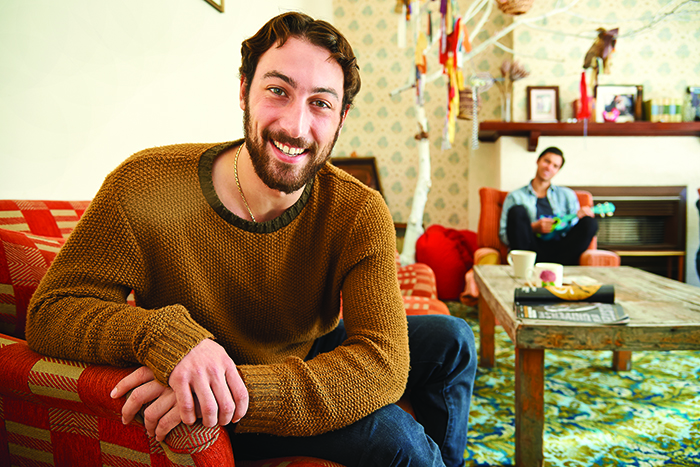
Giuseppe Rotondella is the president of student fund-raising institution Club Fred.
Julie Warn is happy to concur that WAAPA's training is excellent, but is quick to add that the academy "turns out graduates with the right attitude as well".
"They're tenacious, resilient, adventurous and generous. Many of our star graduates, like Hugh Jackman, Tim Minchin and Lisa McCune, are really generous-spirited," she says. "They're not ego-driven at all. One of Hugh's lines is 'Acting is not a solo sport'."
This recognition of inter-dependency combines well with another factor – Perth's distance from Sydney and Melbourne. Instead of being a disadvantage, as might be presumed, the remoteness from these two artistic 'hothouses' seems to work to the students' benefit. Instead of falling under the constant scrutiny of casting agents and directors looking for the 'next big thing', WAAPA students can prosper and make mistakes in relative anonymity. Or, as Andrea Moor puts it, "Exposure to the industry is responsible for taking away their innocence,
a quality WAAPA students are able to maintain.
"As a result of this community environment, the students appear to, on the whole, graduate with a good sense of themselves and openness in their work." The "community environment" is cited by WAAPA students and staff alike as another reason the academy's graduates do so well. The term 'WAAPA family' also pops up frequently, and the nurturing of this 'family' has led to myriad traditions and rituals to support students.
Glenda Linscott, a former star of the Prisoner TV series, joined WAAPA only this year as coordinator of acting. She speaks admiringly of the support, generosity and esprit de corps she has encountered so far. For instance, she says, when students first get offered places, they get 'Facebook stalked' by current students, and bombarded with messages ranging from congratulations to offers of accommodation.
"Orientation week is like Mardi Gras," she adds, with second- and third-year students dressing up and dancing to welcome the 'freshers'.
Sydney-born actor Emilie Cocquerel, who graduated two years ago, takes up the story.
"From the moment you're accepted, your Facebook page is flooded by WAAPA students saying, 'Congratulations! Welcome to WAAPA! You're now part of our family, we can't wait to have you!'"
During orientation week, freshers recite their audition monologues for the whole school. "The students have this huge conga line for the first years," says Emilie, "and while you're getting ready you can hear the audience banging pots and pans and anything they can find, shouting, 'First years, first years!' It's terrifying but it's also encouraging – a little bit like WAAPA in general!"
Another part of WAAPA folklore is the Crack Shack – the nickname for a rental house in North Perth that has accommodated many WAAPA students over the years, thanks to house's supportive owner. The Crack Shack is so called not because it is a den of iniquity but because of its one-time run-down Bohemian presentation. It's said that it once was possible to stand on a certain spot in the hallway of the house and sight five different types of carpet.
"It's the longest-lasting WAAPA house, and people like Jai Courtney have lived there," reports a current resident, Guiseppe Rotondella.
.jpg)
WAAPA graduate and renowned soprano Emma Matthews (photography Hayden Brotchie).
Having accommodation readily available is especially important, considering the high proportion of interstate students in some of the courses. Over the years, Guiseppe says, the Crack Shack has been home to the past three presidents of Club Fred – another WAAPA institution typifying that ingrained sense of family and loyalty.
'Fred' is an acronym for 'Fund-Raising, Entertainment and Debauchery'. The club was founded to raise funds to help graduating acting students produce the 'showcase' videos that woo prospective agents and managers. Nowadays, the fund also pays for flights to Sydney and Melbourne for auditions, and to help graduates set up home when they leave WAAPA. To that end, the second-year acting students who drive Club Fred organise fund-raising barbecues, film nights, 'great debates' and the like.
Musical-theatre students have their own club, Lady Cabaret, for the same purpose, while the dance students have the Boodi Club ("where everyone can shake their boodi").
"Funding doesn't really pour in from the government, so you're left with a group of students who are willing to do things for free to raise funds," says current Club Fred president Guiseppe.
For Jimi Bani, the Logie-award winning Indigenous actor, Club Fred played a key role in his decision to study at WAAPA.
Originally from the Torres Strait Islands, Jimi was contemplating leaving behind his three-year-old child, as well as his support system, to spend three years on the other side of the country where he knew virtually no one. But when WAAPA's Head of Acting, Chris Edmund, explained how acting students helped each other via Club Fred, Jimi was sold.
"That did it for me. I needed that community, coming from the islands. Then (financial help from Club Fred) is a bonus – all you have to do in the third year is focus, and not worry about expenses.
"Club Fred was the reason I said yes, the best decision I ever made."
Support emanates from outside the student cohort, too. Some 1000 strong, the Friends of WAAPA offers both financial and pastoral support to students, and in the past has provided equipment including a sound and lighting desk, and help with buying expensive musical instruments.Friends' chair Kevin Button estimates it has fundraised around $1.8 million for both the students and the academy in its 30 years.
"Our aim is to support the students with things like grants in their final year, and to support them during times of hardship," he says. "Many of them don't have much money, and a lot work part-time to support themselves.
"To me, the reward is to see them continue to the end of their course."
Steve Chapman agrees that maintaining an institution like WAAPA is expensive. Teaching percussion or strings, for instance, requires individual teaching, which in turn means a high staff-to-student ratio. "But the gain we make in reputation is massive," he argues.
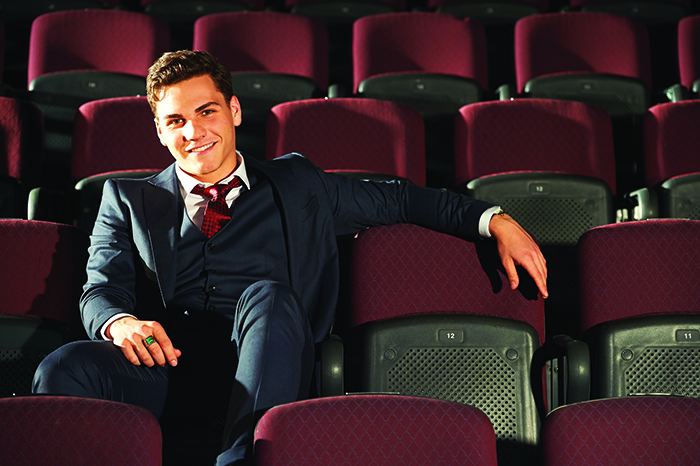
Ben Kindon.
WAAPA is also helped by philanthropic donations, including the Jackman Furness Foundation for the Performing Arts (JFFPA), which aims to raise $10 million.
It was the JFFPA that brought director Patrick Sutton from Ireland to direct The Playboy of the Western World – one of 10 projects the foundation is supporting in 2015 in collaboration with 'Twiggy' Forrest's Mindaroo Foundation.
Other special projects have provided students and staff with exposure to national and international performing arts educators. The JFFPA also established an annual American Repertory Theatre (ART) Scholarship enabling three students to intern at Harvard University. Sound student Christian Peterson's secondment at ART was spent working on a new musical, Waitress.
The students and staff clearly love what they're doing, despite notoriously long hours and often considerable pressure. But the hard work can pay dividends for those who become professional artists, like Suzie Mathers.
"It is a long, hard slog when you're in a long-running musical," she says, 'but
compared to what you do at WAAPA, it's nothing."
Hard yards aside, it seems clear that there's more to a WAAPA education than preparing young people for a life on stage or screen. Ben Kindon collected a Sally Burton Award in June, but he is realistic enough to know that it is no guarantee of work. Nor is the three years he spent at the academy.
He's sanguine about that, however. "Even if my acting career doesn't flourish after this," he says, "I've learnt so much about myself just from being here – like how to be a better human being."
Perhaps that very fact is the real measure of the academy's success.
.jpg) Matt Levett
Matt Levett
Life has been a whirlwind for Matt Levett since he won the 2015 Heath Ledger Scholarship in June. The 2009 WAAPA graduate got the good news in a phone call from the late actor's father, Kim Ledger, and soon afterwards was receiving the award in Los Angeles.
"One minute you're in Sydney, the next minute you're standing in front of all of these people you are inspired by," he says.
Three of the scholarship's judges — Hollywood star Vince Vaughn and Australian actors Rose Byrne and Ben Mendelsohn — were in the audience. So, too, was TJ Power (who filmed Eat, Pray, Love with Julia Roberts and Javier Bardem only a year after he graduated from WAAPA in 2008).
Yet another WAAPA graduate, Emilie Cocquerel, was runner-up, and she gave
a speech from Australia via Skype.
The scholarship comprises cash, visa services and two years of acting classes at the Stella Adler Academy of Acting and Theatre in LA. "I'm about to go on a tour of the school," Matt told Scoop from LA. "I'm really excited about it because your learning doesn't stop after you finish drama school .
"I was always encouraged to continue classes, which I've done."
He says WAAPA has had a "huge influence" on his life, "not just (in learning) the craft of acting but surviving being an actor in the real world."
Matt studied film in his hometown of Sydney, before opting to move for the next stage of his education. "I needed to study away from family and friends, and I think the great thing about WAAPA is it allows you to remove yourself from that environment and just concentrate on building your craft.
"It gives you a chance to not worry about the industry so much, and just concentrate on what you love, because once you get into the real world you're hot with so much politics and the realities of getting a job, trying to make things happen...
"I think back to those years and they were some of the best years of my life,
really, and I'm not the only one who says that. They're doing something
right over there."
Levett's promise was evident at WAAPA, where he won both a Sally Burton Award for Best Male Monologue, and the Leslie Anderson Award for his showcase.
As for his future, he says: "This scholarship has propelled me over here so I'm going to spend a significant amount of time in the States to establish myself here... I'm just gonna ride the wave.
"But I'm hoping to get over there (Perth) and thank Kim Ledger in person."
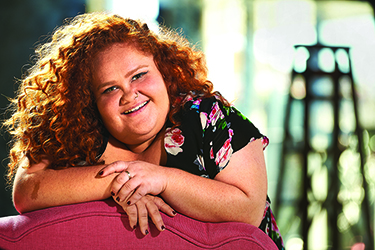 Megan Wilding, actor
Megan Wilding, actor
She was the first act on stage and played only a minor character, but 24-year-old Megan Wilding blew the judges away in June with her performance at the annual Sally Burton Awards. Each year, all 18 of WAAPA's third-year acting students deliver a scene
from Shakespeare.
Megan played the nurse in Romeo and Juliet, and wowed the three judges, including Sally Burton herself, to collect the Best Female Monologue award.
But she shouldn't have been too surprised. Earlier in the year, her performance in Jane Austen's Pride and Prejudice drew this comment from an Australian Stage reviewer: "The standout performance was by Megan Wilding as Lady Catherine de Bourgh, who despite her tiny stature, towered metaphorically over each other character, and ominously over the stage each time she graced it with her presence.
"Every part of her characterisation, from her accent to her physicality to her costume, hair and make-up, was superior."
Ms Wilding studied theatre and acting in Sydney, where she was told about the
one-year course in Aboriginal Theatre at WAAPA, which she finished in 2012.
"Then I auditioned for WAAPA's acting course and got in," she recounts. "Why WAAPA? Why not WAAPA! It's the people, the atmosphere… I walk through the corridors, and the dancers, musicians, actors and musical theatre artists are just bleeding creativity. You want to absorb everything.
"Not only do you learn to become a better actor, you become a better human being."
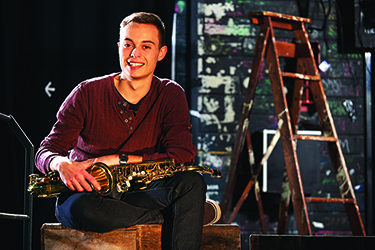 David Gioia, musician
David Gioia, musician
With an older, trumpet-playing brother at WAAPA, and his father a keen amateur pianist, it was always on the cards David
Gioia would study music at the academy.
"WAAPA was always where I was headed," David says.
Starting with the piano, then moving on to the recorder, David finally switched to his present instrument: "I decided the saxophone was pretty cool," he says.
Last year was a big one for the 20-year-old, a Bachelor of Music student. He won
a prestigious concerto competition at WAAPA called the Warana Music Prize,
and the Fremantle Eisteddfod competition. Added to that was the North Perth
Music Festival, where he was named Most Outstanding Instrumentalist.
At WAAPA, David has been enrolled in the classical performance course, but demurs from being labelled a classical saxophonist. "I think it's great because everything is under one roof," he says. "The academy has a strong classical program, and an incredibly strong jazz program.
"The opportunities to collaborate with dancers and music theatre and drama… it's all just available to you if you choose to take it. Often you have to take the opportunities and find your own initiatives."
One of the advantages for WAAPA music students lies with its head of music, Associate Professor Graham Wood, who co-owns The Ellington Jazz Club. "It's a fantastic venue to play in, and I play there once every couple of months," says David, who is in his third and final year at WAAPA.
After graduation, he says, he'll perhaps head overseas, or to Sydney to study honours at the Sydney Conservatorium.
"Whatever I do, I want it to be unique, and I want to be the best at what I'm doing. I want to create a niche for myself and do really, really well. But at this point I don't quite know what that's going to be.
"The next year of my life is going to be exploring that."
.jpg) Sam Young-Wright, dancer
Sam Young-Wright, dancer
Melbourne or Perth? The Victorian College of the Arts or WAAPA?
Canberra schoolboy Sam Young-Wright was faced with that choice in 2010 when he was offered places on dance courses at both institutions. "I loved the idea of moving to Melbourne," he says, but it was WAAPA that got the nod because its reputation preceded it. With dreams of joining Australia's leading contemporary dance outfit, the Sydney Dance Company, Sam attended one of the company's performances in Canberra, and noticed in the playbill that most of its dancers were WAAPA graduates.
Arriving in early 2011, he spent three years studying classical ballet, and in his final year at WAAPA, was seconded to spend a pre-professional year with the Sydney Dance Company. At the start of 2015, he became a fully fledged member of the company, and the 23-year-old is developing into one of the country's most exciting young dancers.
Of a recent performance, Australian Arts Review said: "… it was former Canberra dancer, Sam Young-Wright, who mesmerised the audience from the moment he stepped forward."
Sam attributes his technique to WAAPA and its teachers.
"The training at WAAPA is world-class and I really understand that now," he says. "But you can't really fathom it until you graduate and see other courses and other institutions. What we were given was really special. It's a very rich and intense environment.
"It's tough, but dancers are tough and you develop the resilient nature that this career demands. They're training their dancers to be really intelligent, productive dance artists who can work anywhere. They're turning out intelligent dancers that companies want to employ."
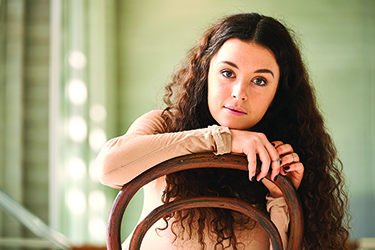 Ayesha Katz, dancer
Ayesha Katz, dancer
When Ayesha Katz first attended a ballet class, aged three, she declared to her mother that it was stupid.
Ayesha recalls: "I said, 'I'm never dancing again!'" The embargo lasted until Year 8, when she undertook a certificate course at WAAPA, leading to discussion with academy students and teachers, and one thing, as they say, led to another. Now aged 20, she is in the third and final year of a Bachelor of Arts (Dance) degree.
As with 30 to 50 per cent of WAAPA's dance students, Ayesha is West
Australian. Nanette Hassall AM, the academy's distinguished head of dance,
says there were 350 applicants for 35 places in the dance stream last year.
"Certificate courses are run to encourage local students to come in and benchmark their performances," says Nanette.
"For me, it was the most obvious place to go because the calibre of dancers
they produce is so high and known all across the world," Ayesha says.
After graduating, her aim is to embark on a career as an independent dancer working with different people on different projects, rather than with a single company. "It's a hard path but it's one bursting with creativity and choreography," she says.
Nanette, who has taught dance and choreography internationally since graduating from the famous Juilliard School in New York, says working as an independent contemporary dancer in Perth has become more viable over the past 20 years.
"Also, dance has really taken off in WA secondary schools, and a lot of the students are really sought after to teach dance. It's a growth area," she adds.
 Chloe Ogilvie, lighting designer
Chloe Ogilvie, lighting designer
The mining industry lured Chloe Ogilvie's family to the Pilbara. The theatre brought her back to Perth.
Chloe, 20, is studying lighting at WAAPA as part of an advanced diploma of live production and management services. "It's such an important part of theatre and it's fun to work behind the scenes," she says. "Lighting really shapes a performance, and it's interesting to see how much effect you can have on the narrative of a story just by changing the lights."
She has already had first-hand experience of the power of light. Earlier this year, she spent time in Melbourne on secondment on The Lion King. Then she worked at Yirra Yaakin, an Indigenous theatre company based in Subiaco. "I'm working on a new piece, and right now we're in rehearsal and creative development," she says.
In November she'll graduate, and then continue her studies at WAAPA with
a Bachelor of Performing Arts. "In the last three years I've made more friends here than I can count," she says. "It's like a family."